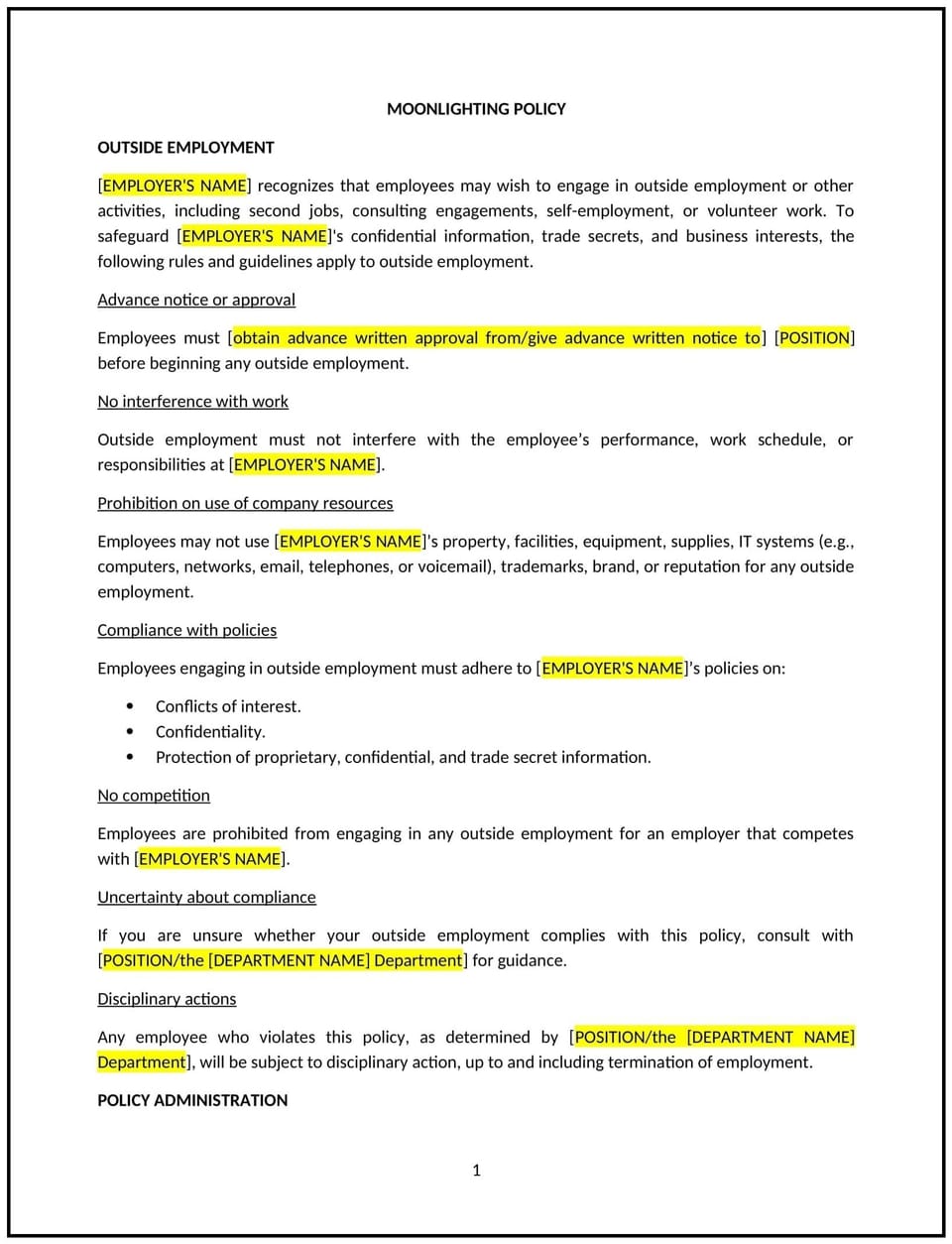Moonlighting policy (Arizona): Free template

Moonlighting policy (Arizona)
In Arizona, a moonlighting policy provides businesses with guidelines for employees who engage in secondary employment or side work outside their primary job. This policy helps protect the organization’s interests while balancing employees’ right to pursue additional work.
This policy outlines acceptable parameters for moonlighting, including restrictions to prevent conflicts of interest, interference with job performance, or misuse of company resources. By implementing this policy, Arizona businesses can maintain operational efficiency and protect sensitive information.
How to use this moonlighting policy (Arizona)
- Define acceptable practices: Specify the conditions under which employees may engage in secondary employment, such as ensuring it does not conflict with their primary job responsibilities.
- Prohibit conflicts of interest: Include restrictions on working for competitors, vendors, or clients that could jeopardize the company’s interests.
- Address time commitments: Emphasize that moonlighting should not interfere with job performance, attendance, or availability for the primary role.
- Protect company resources: Clearly state that company equipment, time, or proprietary information cannot be used for secondary employment.
- Include reporting requirements: Require employees to disclose any secondary employment to HR or management for review and approval.
Benefits of using a moonlighting policy (Arizona)
This policy offers several advantages for Arizona businesses:
- Protects business interests: Reduces risks associated with conflicts of interest or misuse of company resources.
- Ensures productivity: Prevents secondary work from impacting employees’ primary job performance or availability.
- Supports compliance: Aligns with Arizona labor laws and ethical standards for employee conduct.
- Promotes transparency: Encourages open communication between employees and management about secondary employment.
- Builds trust: Demonstrates fairness by balancing company protections with employees’ right to pursue additional opportunities.
Tips for using a moonlighting policy (Arizona)
- Address Arizona-specific considerations: Reflect the state’s economic landscape, where side work or gig opportunities are common, and balance flexibility with company interests.
- Educate employees: Provide clear examples of acceptable and unacceptable moonlighting practices to ensure understanding.
- Monitor disclosures: Regularly review reported secondary employment to identify potential conflicts and address concerns proactively.
- Maintain confidentiality: Handle employee disclosures discreetly to protect their privacy and maintain trust.
- Update regularly: Revise the policy as workplace dynamics or legal requirements change.
Q: What types of secondary employment are prohibited under this policy?
A: Secondary work that creates a conflict of interest, involves a competitor, or uses company resources or confidential information is prohibited.
Q: Are employees required to disclose moonlighting activities?
A: Yes, employees must disclose any secondary employment to HR or management to ensure it does not conflict with their primary job responsibilities.
Q: How does this policy address conflicts of interest?
A: The policy prohibits employees from working for competitors, vendors, or clients in roles that could compromise the company’s interests.
Q: What happens if moonlighting affects job performance?
A: If secondary work interferes with performance or availability, employees may be asked to adjust or cease their outside employment.
Q: How does this policy support compliance with Arizona laws?
A: The policy aligns with Arizona labor laws to ensure fairness while protecting the company’s operational and legal interests.
This article contains general legal information and does not contain legal advice. Cobrief is not a law firm or a substitute for an attorney or law firm. The law is complex and changes often. For legal advice, please ask a lawyer.


